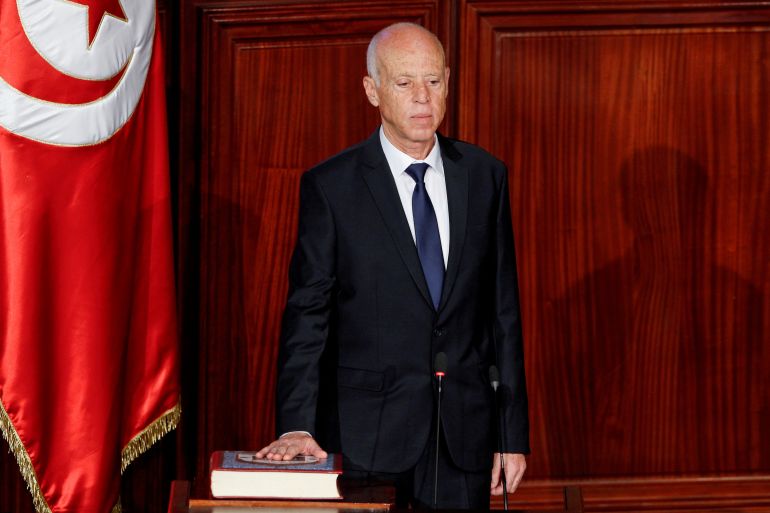Tunisia’s Saied says will not ‘turn into a dictator’ amid arrests
President Saied rejects accusations he staged a coup, as a judge and two members of parliament arrested.

Tunisian security forces placed a judge under house arrest for 40 days, local media reported on Saturday.
The decision against Judge Bechir Akremi came after President Kais Saied pledged to lead a campaign against widespread corruption.
Keep reading
list of 3 itemsThe political crisis unfolding in Tunisia
Tunisian MP critical of president arrested by security forces
It also came a day after Saied said he would “not turn into a dictator” after the arrest of two MPs on Friday, following his decision to lift their immunity when he seized control of the government this week.
Tunisia has been thrust into a political crisis by Saied’s move on Sunday to dismiss the prime minister and suspend parliament for 30 days, leading main parties to accuse him of a coup.
Saied has yet to carry out steps that critics say are needed to reassure Tunisians, including the appointment of an interim prime minister and a road map to end the emergency measures.
“I know the constitutional texts very well, respect them and taught them and after all this time I will not turn into a dictator as some have said,” the presidency quoted the former law professor as saying.
On Sunday, Saied removed the immunity of parliament members, leaving any with cases against them vulnerable to arrest.
Concerns over rights and freedoms in Tunisia, a democracy since the 2011 revolution, rose on Friday after the arrest of parliamentarian and influential blogger Yassin Ayari and the announcement of investigations into alleged violence by people protesting against Saied’s actions during a demonstration on Monday.
The military judiciary said on Saturday that Ayari will be imprisoned for two months after being convicted of “demoralising the army”.
Tunisian news agency TAP on Saturday, citing the military judiciary, said a military court in 2018 issued a final two-month sentence against Ayari for “participating in an act aimed to wreck the army’s moral”.
Ayari has spoken out against the military and the government and faced legal problems in the past.
Another member of parliament, Maher Zid of the Karama party, was detained late on Friday, according to his lawyer.
He was sentenced to two years in prison in 2018 for offending people on social media and insulting the then president.
On Monday, the biggest party in parliament, Ennahdha, held a sit-in outside parliament after it was surrounded by the army.
Hundreds of supporters of Ennahdha and Saied confronted each other, some throwing stones and bottles.
The judiciary said it had opened investigations into four people linked to Ennahdha for “attempting to commit acts of violence” during the protest, including a member of a party council and two members with connections to its leader.
Ennahdha has been a key player in Tunisian legislative elections since the country’s 2011 revolution, which unleashed the Arab Spring uprisings across the region.
Saied’s move to seize executive control appears to have widespread popular support in Tunisia, where years of misgovernance, corruption, political paralysis and economic stagnation have been aggravated this year by a deadly surge in COVID-19 cases.